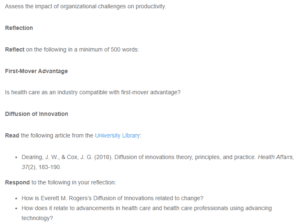Scanning the Health Sector as an Industry Expert
The healthcare sector is integral to community well-being and development. Healthcare leaders play a vital role in informing and guiding changes in the healthcare sector. Through their advocacy roles, they can not only participate in formulating policies on healthcare but can themselves be merchants of positive changes within their communities. Central to healthcare leaders’ responsibility of informing and guiding positive changes within the communities they serve is their ability to collaborate with local, state, or national leaders in effecting positive changes in healthcare. Healthcare leaders can utilize several strategies to interface with local, state, and national leaders to create a dialogue concerning local healthcare challenges.
Maintaining political astuteness can help healthcare leaders leverage the political resources necessary for addressing local challenges. Political astuteness may help healthcare leaders work with contest and conflict to front local healthcare challenges. It may help them establish strategic alliances and partnerships with various healthcare stakeholders who may help drive positive changes within the healthcare sector. Clarke et al. (2021) note that political astuteness fronts a self-serving and devious agenda that manipulates the system toward supporting the organizational vision and goals. It eliminates bureaucracies in getting things done by governments and ensures preferential treatment of the organization. Thus, it is imperative that healthcare leaders maintain political astuteness in their pursuit of addressing local challenges.
Healthcare leaders can also work with local, state, and national leaders to address local healthcare challenges. Constant communication is pivotal in this respect. The ability of healthcare leaders to effect positive changes within the healthcare setting will be dependent on how steadfast they are in voicing their concerns to their leaders (Waring et al., 2018). By seeking shared goals and inclusivity in the healthcare agenda of various governments, healthcare leaders can front their interests and thereby oversee the issues addressed.
Sawyerville is a small community in Hale County, Alabama. This community has traditionally struggled with the low supply of mental health services. This is despite an increase in the prevalence of mental health illnesses in the area. Increasing mental healthcare services in the area may help preserve many lives. This issue can be shared with the governor of Alabama, Kay Ivey, as well as with its senators, Katie Britt and Tommy Tuberville, to help advocate mental health reforms at the federal level. It can also be shared with Hale County’s state officials. These individuals can work concertedly to address healthcare challenges in Sawyerville.
Innovations often serve to improve the operational efficiency of the system. However, some innovations may threaten the system that supports the business and the employees. In such scenarios, organizations may be forced to change with the outcomes skewed towards the negative side. Developing a working system is vital in the organizational operational framework. Innovative ideas seeking to improve an aspect of the organizational framework of operation may threaten this system if it fails to meet the quality requirements, fails to attract more customers, or fetches significant cost considerations. This may result in a conflict between the systems and the new idea. In this respect, the organization may be forced to make significant adjustments to its operational framework to accommodate innovation.
The incorporation of health information technology is an example of an innovation that threatened the healthcare system that supported the business and employees. As healthcare organizations began implementing various health information technologies, the system was disrupted as healthcare providers had to learn these systems. Hospitals also had to employ personnel to aid in their use. Many employees were also rendered obsolete as these technologies took over their jobs.
References
Clarke, J. M., Waring, J., Bishop, S., Hartley, J., Exworthy, M., Fulop, N. J., Ramsay, A., & Roe, B. (2021). The contribution of political skill to the implementation of Health Services Change: A systematic review and narrative synthesis. BMC Health Services Research, 21(1). https://doi.org/10.1186/s12913-021-06272-z
Waring, J., Bishop, S., Clarke, J., Exworthy, M., Fulop, N. J., Hartley, J., & Ramsay, A. I. (2018). Healthcare leadership with political astuteness (help): A qualitative study of how service leaders understand and mediate the informal ‘power and politics’ of major health system change. BMC Health Services Research, 18(1). https://doi.org/10.1186/s12913-018-3728-z
ORDER A PLAGIARISM-FREE PAPER HERE
We’ll write everything from scratch
Question 

Scanning the Health Sector as an Industry Expert
Assess the impact of organizational challenges on productivity.
Reflection
Reflect on the following in a minimum of 500 words:
First-Mover Advantage
Is health care as an industry compatible with first-mover advantage?
Diffusion of Innovation
Read the following article from the University Library:
- Dearing, J. W., & Cox, J. G. (2018). Diffusion of innovations theory, principles, and practice. Health Affairs, 37(2), 183-190.
Respond to the following in your reflection:
- How is Everett M. Rogers’s Diffusion of Innovations related to change?
- How does it relate to advancements in health care and health care professionals using advancing technology?